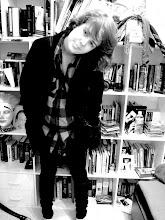Eric is going to Florida, and I don't like it when people I love go away.
Especially when they go away to the U.S., simply because the U.S. terrifies me to no end.
Yes, call me a wimpy Canadian, but we izz not startin warz hur.
We are just going on "peacekeeping" missions, remember?
Sidenote, my computer automatically makes my font Comic Sans and it makes me want to vomit.
Other sidenote, I understand why some people don't like Catcher in the Rye, freedom of everything and all that, but I especially don't understand how people who love English and are interested in literature and are going into it and all cannot love and appreciate it. On the other hand, I think one must have Holden-like tendencies, or at least be aware of said Holden like tendencies, to truly appreciate the novel, and unless you are depressed and like chatting up prostitutes, you do not fit the category.
Other other sidenote,
ESSAY IM WORKING ON
Which I literally have not edited at all....
As far as many feminists are concerned, all centuries prior to the twenty-first portrayed women in fiction in a sexist light, as female characters were either written by men, or written in a time when men held precedence over the ideals portrayed in said fiction. There are some obvious exceptions: Austen, Woolf and Bronte all being perfect representatives of such, but it was the ideals, as opposed to the author’s, which stirred the pot regarding female stereotypes, and which helped woman gain headway on the path to equality. Sexuality is one of the most double-sided swords in literature, and modern society, as the way woman and their bodies are presented in the media is often reflected and refracted down the line until it reaches everyday people, and their impressionable minds. Sexuality is, however, not necessarily a negative thing for women, because although it is not always expressed in a positive way, (phallic-centred pornography, the weak-willed Eve in theology and Sirens in mythology) it can be a positive and empowering tool for women. In the novels To the Lighthouse by Virginia Woolf, Gravity’s Rainbow by Thomas Pynchon and Cat’s Eye by Margaret Atwood, the double-standard of female sexuality is examined, as each female protagonist relies upon their sexuality as a means of empowerment and fulfillment in their lives, and as a tool to control those around them. The role of these women and the degree’s of the ‘sex’ in their sexuality differs in each respective environment, but each woman weaves a spell over those around them, and are continuously perceived as inhuman by those in their lives. Of course each woman is only human, each flawed, and the main flaw in each is their extreme need to be needed, as their role as the satisfier of other’s needs, whether they be sexual or maternal, is a role that they require to feel complete, and useful. Unfortunately this need to be needed backtracks on feminism, as the women want to be put in these roles - as the seductress, or the mother figure - but they cannot be condemned for feeling empowerment and strength in their seemingly degrading roles, as long as those roles give them empowerment and strength of some sort.
It is a common misconception in society that a woman giving love or re-assurance does not gain any reciprocated satisfaction, but each woman in the three aforementioned works of literature defy that misconception. The comfort of putting one’s children to bed, appeasing each individual child’s wants and desires, and putting them to sleep with happy thoughts in their heads is satisfaction in itself; despite the fact that the word ‘sexuality’ immediately brings to mind an image of a voluptuous, scantily clad woman, sexuality also is closely associated to the word ‘power’, which almost instantaneously brings to mind an image of a man. Power is not exclusive to politics, or the phalace, and a mesmerizingly beautiful and alluring woman can carry with her a power and sexuality which blends into a hybrid, a strength that is revolutionary, and addictive.
The beautiful and apparently ageless character, Mrs. Ramsay, from Virginia Woolf’s To the Lighthouse, is an example of a woman who wields her lovely nature and appearance as a magic, and cast’s a spell of sexuality on those around her, but does not use her sexually in an explicit manner. Although her lack of promiscuity may be a direct result of the time period in which she was conjured, that period being early twentieth century, Mrs. Ramsay in the most romantic of the three different characters, and has a grace which is widely acknowledged, as even roaming poets herald her as “the Helen of [her] days” (P33), alluding to the simultaneously beautiful and destructive Helen of Troy, from Greek Mythology. Mrs. Ramsay’s rapturous qualities are effortless, as she does not seduce those around her with anything but her kindness and her superficial beauty: even the visiting, male-supremist Charles Tansley is awe-struck in her presence, and looks upon her as “the most beautiful person he ha[s] ever seen” (P20), while the condescending feminist painter Lily Briscoe cannot help but look upon Mrs. Ramsay and be “in love with her” (P45), and “in love with it all” (P46).
4.27.2010
Subscribe to:
Post Comments (Atom)

No comments:
Post a Comment